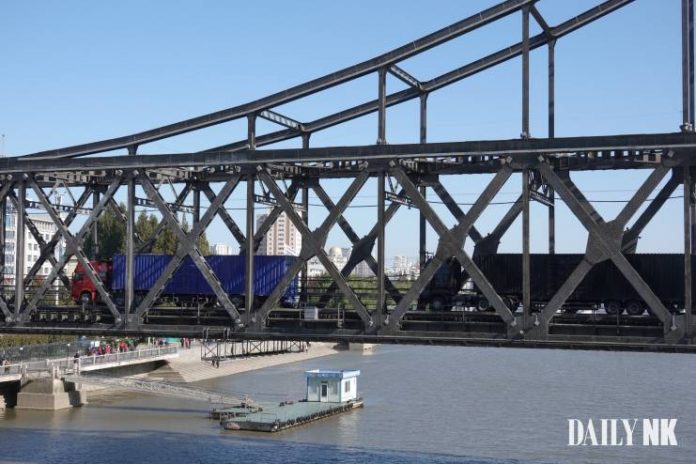
Amid the resumption of person-to-person travel between North Korea and China, North Korean officials are rotating out some of the North Korean trade officials who are assigned to work overseas. Those movements are leading some to predict that North Korean imports to and exports from China will pick up this year.
At the same time, North Korea is tightening its grip on trade representatives working overseas for fear of ideological backsliding. Daily NK has learned that the North Korean authorities are stepping up their ideological policing by subjecting trade officials to random searches of their mobile phones and homes.
A North Korean trade representative in China told Daily NK in a recent interview that the authorities’ surveillance makes it hard to even meet with Chinese traders. Agents from the Ministry of State Security are always following him around to monitor everyone he meets and everything they talk about.
Furthermore, the trade representative said he has to pay onerous customs duties even though he is importing goods desired by the authorities, which makes it tough to turn a profit in his business.
Read on for Daily NK’s interview with the trade representative.
Daily NK: We’re curious about what kind of Chinese items you usually import to North Korea.
“We get whatever the state wants and send it home [to North Korea]. We’ve been handling a lot of farming equipment since the end of last year, but there are any number of things: automobile parts, televisions, and computers. We’ve also been moving a lot of electronics recently after receiving orders for electronic goods. The most imported items change all the time. We were moving a lot of edible stuff—rice, alcohol, fruit, and processed food—through early 2023 and the middle of the year. But nowadays, we aren’t importing a lot of things to eat or drink. That’s because the government wants a lot of machinery and electronics.”
Daily NK: Is this your first time overseas?
“This is my first time going anywhere that’s not in North Korea.”
Daily NK: What’s the best part about leaving?
“I guess I enjoy seeing the world. At first, everything in China was just amazing. It was all so shocking—I found myself gawking at things. The occasional dinners I have with Chinese traders bring home how different things are from back home. Taste aside, you can tell how abundant things are. Even so, that amazing feeling of being overseas wears off pretty quickly. If anything, I feel less able to speak my mind here in China than when I was back in North Korea. State security agents are always tagging along, which makes it hard to meet traders and present our requests. It’s not like we’re trying to do anything sketchy. All we want is to have access to foreign websites and stay in touch with traders so we can fill out the government’s orders with high-quality items at a cheap price. But we get accused of reactionary behavior whenever we’re caught doing anything, and that’s not helpful.”
Daily NK: Were surveillance and control the hardest parts about working as a North Korean trade representative in China?
“Another problem was our limited access to funds. Here in China, prices are high, and a close inspection shows that a lot of products are worse quality than you’d think. It’s really hard to buy good products on our budget. When you find something of decent quality, you have to pay 30% upfront for the contract. Suppose we can come up with the down payment somehow. After the goods are shipped to North Korea, we’re supposed to pay the remainder of the cost right away, but we often find ourselves in a bind because funds are delayed. Chinese vendors don’t like to deal with people who aren’t prompt in their payments. You have to pay up right away if you want to keep doing business and build trust with a good trader. It’s hard to maintain a good relationship when you’re short on funds.”
Daily NK: We understand the volume of trade between North Korea and China is increasing. Considering that trade is likely to be even brisker in the future, what would you like to see as a trade representative this year?
“When I was back in North Korea, I assumed I’d have frequent chances to meet traders in China and that it would be easy to buy good and affordable products to ship back home. I guess you could say I had some big dreams. I also expected to make a lot of money, but now that I’m here, the conditions aren’t great. We’re under too many restrictions, even here. We’re not free to go around buying stuff, and we’re not even allowed to have normal meetings with people. As if that weren’t bad enough, we have to pay exorbitant customs duties whenever we want to send goods over the border. Duties are 40% of the cost of the goods, and there are other expenses, too, including shipping and fees for the Chinese. Those duties are too high when you consider we’re bringing in the goods the government wants. It would be nice if they could lower the duties, if only by a little. And considering that we’ve got to go around and meet a lot of people if we’re supposed to come up with good-quality products, I think that lifting some of these restrictions would make us more effective in our work.”
Translated by David Carruth. Edited by Robert Lauler.
Please send any comments or questions about this article to dailynkenglish@uni-media.net.


















